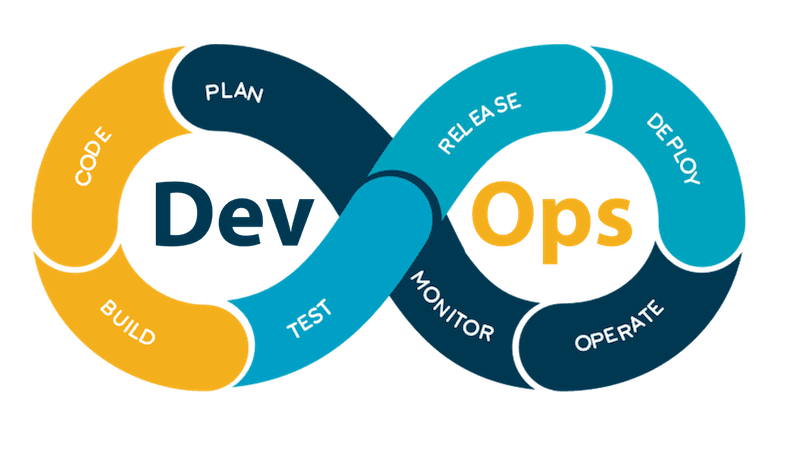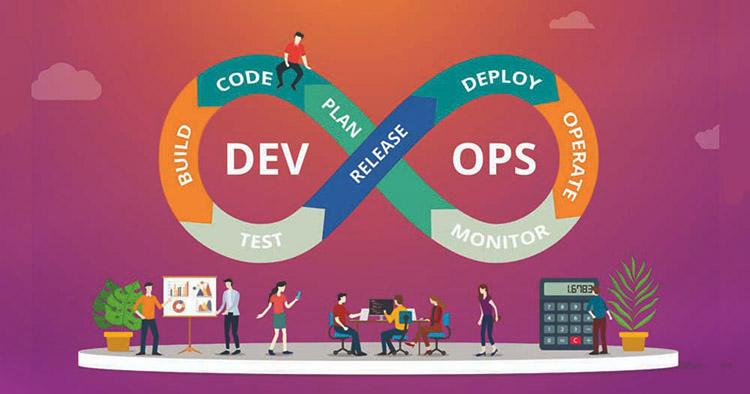The Importance of DevOps in Mobile App Development

It is estimated that the number of users on smartphones has reached 3 billion and is expected to increase by several hundred million over the coming months ( Source). With an increase in the number of smartphone users and downloads of apps, It is evident that the market for mobile app development is expanding at a steady growth rate. There is no indication of slowing down soon.
The world of technology is advancing toward more disruption, but this is not the case at the beginning of the digital revolution.
When we were still navigating the waves of digitalization and the rise of IT, the industry was determined to meet the ever-growing market requirements for mobile phones, and companies were focused on creating an online presence.
In the end, crucial elements of mobile application development like the cost of development and security, quality of the code, and maintenance were put in the dust.
The raging wave has finally settled down, and now app development companies have taken over the front row. It is now essential to pay attention to previously ignored factors and adopt new approaches that offer high-quality solutions at less expense in this ever-changing landscape.
That’s precisely the way DevOps comes into the picture.
DevOps for mobile app development is a new method of enabling seamless app development from conception to production. The features of DevOps break the development-operations barrier and mark the departure from the traditional waterfall approach to agile software development.
What is DevOps?
DevOps is an innovative method of collaboration based on effective communication between all the parties involved creating of the digital product. It involves Project managers, mobile app developers, and operations team employees.
The traditional methods and approaches to software development have led to increased costs, development time, and dissatisfaction from customers. DevOps can bridge the gaps between operations and development and solve the issues with continual software development.
The concept behind DevOps to mobile apps development is to encourage the culture of collaboration between teams who previously worked in silos.
DevOps is more than just a methodology, it’s also a culture or a state of mind. It brings about a shift in mindset, enhances collaboration, and helps facilitate tighter integration. It connects agile, continuous delivery, and automation to ensure that the development and operations teams are more productive and release software quickly and with more excellent reliability.
With DevOps, it is now relatively easy to align the goals of a business and offer greater quality to the customers. Implementing DevOps within the corporate world is highly profitable. It is the same for companies as it can bring positive returns on investment.
A study has revealed that companies who implement DevOps experienced 63% an improvement in the effectiveness of the software they deploy. 63% were able to develop new software more often. (Source)
How is DevOps Different From Agile App Development?
DevOps and Agile are terms that are commonly used in the mobile app development, and the majority of firms employ at the very least one of these methods.
There are various ways that organizations can adopt both agile and DevOps in developing mobile apps. Some consider Agile as well as DevOps to be synonymous. But, this isn’t accurate. There is a significant distinction between agile and DevOps.
DevOps is an approach to software development focused on communication, integration, and collaboration between operations and development to enable the rapid deployment of software. It’s set methods that streamline the process, help teams work together, and improve a business’s capacity to deliver goods and services.
Agile Methodology is a method of the continuous development process and testing. The agile development process breaks products into small parts and then integrates them to allow for final testing. Agile development is incremental and iterative. It is implemented in various ways, like Scrum, Kanban, etc.
The agile method requires more Scrum meetings and retrospectives to fix any gaps in communication between developers and customers. DevOps to support mobile app development involves more documents and specifications to fill in the differences between operations and development.
The founding principle of agile is to bring Agility to development while DevOps revolves around bringing agility to both development and operations.
Benefits of implementing DevOps
DevOps has broken through the barriers and put development and operations together. Before DevOps, the developers would write their code in the first place and then forward it to the operation team.
The method makes the development process efficient. It makes sure that the responsibilities are evenly distributed across different teams, and that goals are set so that each team is clear about the app’s performance.
If you’ve been thinking what the reason DevOps is the best choice for developing mobile apps, The following are the advantages that it can provide:
Reduces time to release
DevOps tools for mobile app development allow for near-real-time cooperation across teams, particularly between operations and delivery. As a result, the time spent on design development is reduced. Iterative cycles result in more frequent code deployment, regression testing, and speedier phase-by-phase release.
Resource-efficient use
Updates, rapid features delivery, and event updates can be achieved easily when the development and operations teams are in sync – something that each application development firm following DevOps promises.
Another aspect that contributes to the efficient utilization of resources includes the extensive utilization of automation. From source code management to development platforms and the tools for testing, DevOps is dependent on automated processes to enable frequent and instant releases.
Eliminate bottlenecks and inefficiencies
The goal of DevOps is to make processes more transparent, effective and improve communication. The alignment regarding the tools, processes, and practices plays an important role in removing bottlenecks and inefficiencies.
- Manual intervention
- Inconsistent development environment
- Stability and maturity of workflow
- Incompleteness of operational procedures
- Incomplete ownership.
Better feedback
One of the major advantages of DevOps is the capacity to receive immediate reports and feedback. Additionally, it gives stakeholders full transparency in the testing and development process. This transparency provides mobile app developers an easy way to identify issues quickly and then rectify or refactor the user experience.
Alongside these, DevOps offers many other advantages such as:
- A better customer experience
- Stable and stable environment for simple deployments
- Improved collaboration between teams
- Release time faster
- More rapid resolution of bugs and other errors
- There is still time to innovate
- Continuously delivered software
- Better employee engagement
The 6 Cs of DevOps Adoption
The adoption of DevOps to develop mobile apps involves implementing the six key components that connect the entire process and result in top-quality solutions.
Continuous planning
Continuous planning is the process of connecting all project participants, which includes project managers, developers, business analysts, operational staff, and all other participants, to a single platform that defines the purpose of the project and determines the results and resources.
Continuous integration
The way to write code should be collaborative to make sure that code created by one team is seamlessly integrated into the code of the other. Continuous integration is a key component of DevOps that concentrates on frequent, errors-free builds combined with the previously written code.
Continuous testing
Testing is an essential element of the application development process. It aids in identifying any issues or bugs that may arise with the application earlier and ensures that the best products are provided to the client.
The main goal of continuous testing is the ensure that tests are conducted early and frequently. The benefits of automating tests in DevOps are commonly discussed. It is an essential part of the development process for the software.
Continuous monitoring
DevOps lets developers carry out more testing and monitoring before the application is released to the user.
Continuous monitoring aids in identifying and solving issues. The development process remains steady regardless of the amount of change, without any human intervention. This ensures that the application is reliable and runs exactly as you would.
Continuous delivery
Continuous delivery refers to a method that involves delivering updates and software into the production environment in small amounts to ensure that the software is launched at any time.
DevOps within mobile applications ensure that changes to the code are made when the changes are implemented. The primary goal of continuous delivery will be to develop the application, test, and then release it to customers faster and more often in shorter timeframes.
Continuous deployment
Another principle that is essential to DevOps is continuous deployment. Continuous deployment is a technique wherein software that can pass the automated testing stage is released into the production environment on time.
How do you implement Mobile DevOps?
Suppose you’ve decided to implement mobile DevOps. Here are the three steps you must adhere to:
Continuous Delivering Integration
Developers should learn to write code in a way that is easily integrated with others. Mobile DevOps workflows must be designed, so that code that is written by one team is seamlessly integrated with code written by a different team. The development teams should ensure that all assets used in the development, such as text files, scripts documents, configurations, and code are easily traceable.
Continuous integration means that it is essential to ensure that you can deliver continuously. This makes sure that the software can be launched quickly when it’s complete. Although there’s a manual method, it is essential to automate the process if the work becomes too stressful.
Monitoring and testing
A wide variety of variables will determine the performance of a mobile application. This includes the vast array of devices the application must use while considering the device resolution, screen size, functionalities, capabilities, and many more. Testing needs to be conducted using emulators and simulators in the real world. Utilizing an automated test process helps manage the frequent build, bug identification, and solving problems.
It is pretty normal for an application will perform very well in the test environment but fail in the actual setting. Many factors can be linked to failures, like the network’s conditions and power, memory, etc.
Therefore, developers must ensure continuous monitoring of performance by adding third-party SDKs like logs, crash reports, etc., to discover the reason for the issue.
Quality Control
The measurement and validation of all the components that comprise the program from beginning to delivery, including the changes made between, is vital. Ratings and feedback on the app store must be continuously monitored. This helps address issues and opens the way for future enhancements and modifications.
How to calculate the ROI of Mobile DevOps
There are some mobile DevOps issues, and their implementation can cost money and time, but the DevOps model’s benefits are numerous, and the rewards are also numerous.
A better customer experience
The main goal of any company is to provide its customers with the best products and services. DevOps develops better quality applications for customers through constant automated testing. It improves the user experience and levels of satisfaction.
Apps with higher ratings show higher in the app store and are easy to find. Testing is crucial to launching the best product. Accelerating the speed of testing can help reduce time to market and also provide an improved experience for customers at the same time.
Increased innovation
A company is truly innovative when it can quickly release new products of top quality and quality to the market. With DevOps, an organization can react quickly to the feedback of customers and a changing market.
DevOps in mobile app development assures that the development team can create and distribute high-quality apps with a thorough test to satisfy the demands of the users.
Better software quality
DevOps facilitates faster development and more regular releases and produces stable and high-quality software.
When Agile is combined with DevOps, better collaboration and solving problems. The DevOps method implies that everything is monitored closely, including the user experience, performance, and security. The result is stable and robust software.
Risk reduction
Although the DevOps and Agile frameworks promote change and the development lifecycle is more fluid, these modifications or iterations are thoroughly tested before being released to clients. DevOps minimizes hazards greatly in this way.
Automating testing will ensure that every bug is identified and rectified before the product’s launch. It also provides that the company doesn’t make its customers beta testers.
Conclusion
The benefits of DevOps are numerous, but the result is the same: they can turn you into an impactful change.
At Bestarion, we use our mobile DevOps development to aid our clients in reducing the time to market new features while making use of new market opportunities.
Implementing DevOps isn’t an easy process. It requires many technical, strategic, and business-related decisions; however, it will add tremendous value to your business through increased efficiency and profits if implemented successfully. We’re proud to be the leading mobile app development firm located in Vietnam, which can assist you in developing digital products that are industry-changing that are backed by our DevOps knowledge.



